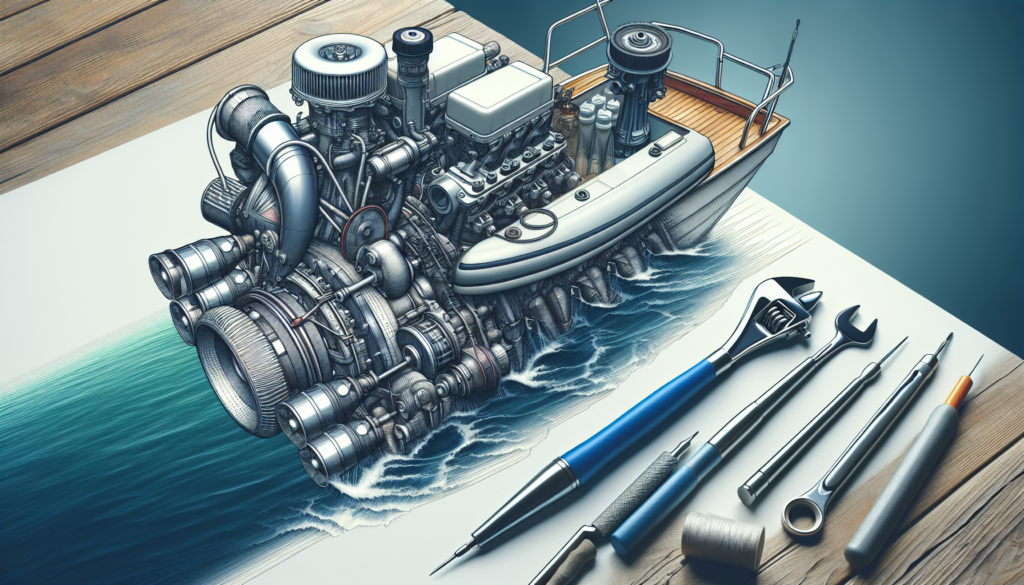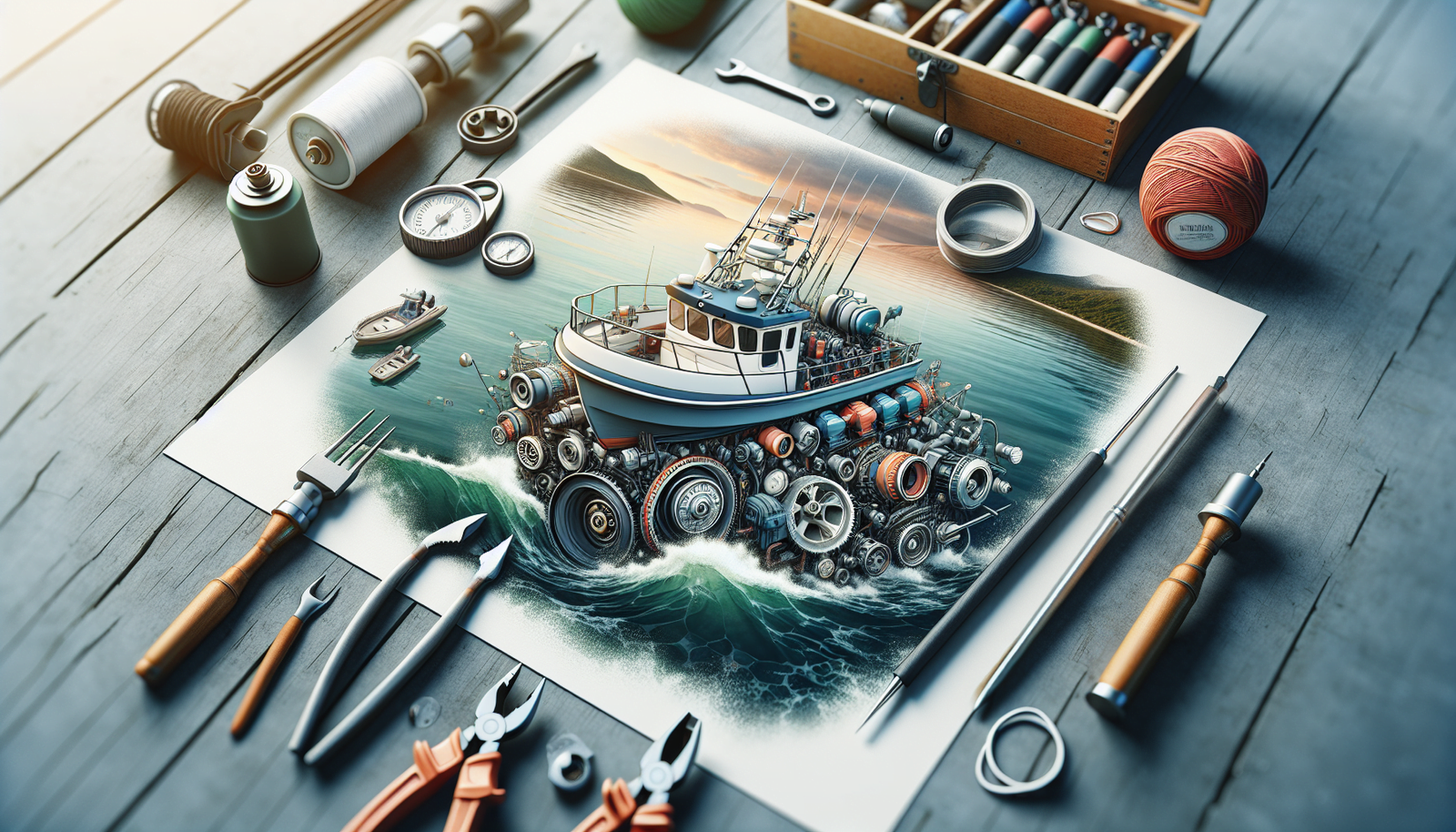Just like your car, your fishing boat engine requires regular maintenance checks and tune-ups to keep it running at peak performance. The health of your fishing boat engine can make or break your fishing trip – you wouldn’t want it dying down in the middle of the sea. In “Best Practices For Tuning Up Your Fishing Boat Engine,” you’ll snap up handy tips and practices to keep your engine in tiptop shape. This essential guide is all about saving costly repairs and ensuring your fishing boat engine has a long, healthy life. Get ready to become your own boat engine mechanic!
Understanding Your Boat Engine
Maintaining your boat engine is an essential part of owning a boat. Just like your car needs regular oil changes and tune-ups, your boat engine requires regular maintenance to keep it running smoothly. This is not only necessary to ensure your engine’s longevity but also to avoid unwanted breakdowns when you are out enjoying the water. And to maintain your engine, first, you need to understand its workings and types.
The Importance of Regular Boat Engine Maintenance
Operating a boat engine in water, especially salt water, is a tough task. Corrosion, water intrusion, and wear and tear from frequent pouring and stopping can take their toll. Hence, regular engine maintenance is crucial for preventing small, fixable issues from becoming major, costly problems. It also helps in improving your engine’s performance, increasing its lifespan, and ensuring your safety on the water.
Types of Boat Engines
Boat engines can be primarily categorized into two types: outboard engines and inboard engines. Outboard engines are mounted on the stern of the boat, while inboard engines are situated within the boat hull’s center. While outboard engines are highly popular due to their easy handling and simple maintenance, inboard engines are preferred for their power and stability.
Mechanics of a Boat Engine
Just like a car engine, a boat engine operates on the principle of internal combustion, where fuel is burnt inside the engine to generate heat, which in turn generates motion. Remember, a more profound understanding of the mechanics of your boat engine will aid in troubleshooting and maintenance.
Engine Oil Change
Maintaining your boat also involves regular engine oil change. It is much like changing the oil in your car – only slightly trickier.
Frequency of Changing Engine Oil
Ideally, you should change the engine oil every 100 hours of operation or at least once a year, even if the boat has not been used much. This can vary slightly depending on the engine’s make and model, so always check your owner’s manual.
Choosing the Right Engine Oil for Your Boat
The type of oil you need depends on your boat engine type. A four-stroke outboard engine, for instance, requires a different oil than a two-stroke engine. To select the right oil, refer to the owner’s manual, or consult with a marine mechanic.
Steps to Change Your Boat Engine Oil
Changing the boat engine oil involves draining the old oil, replacing the oil filter, and adding new oil. However, since the procedure can differ slightly depending on your engine type, it is recommended to refer to your engine manual or hire a professional.

Fuel System Maintenance
Maintaining your boat’s fuel system is an essential part of routine boat maintenance to ensure optimum performance and fuel efficiency.
Cleaning the Fuel Tank
Over time, sediment and contaminants can accumulate in the fuel tank, leading to engine problems. That’s why it’s important to clean your fuel tank at regular intervals as part of your boat maintenance routine.
Replacing Fuel Filters
Fuel filters should be replaced every 50-100 hours of operation, as they help remove dirt, rust, and other impurities, preventing them from entering your engine.
Understanding Fuel Additives
Fuel additives help to improve boat engine performance and longevity. Some additives clean the engine, some protect against corrosion and rust, while others improve fuel efficiency. Be sure to use the right additive for your boat engine type and needs.
Spark Plugs Replacement
Like car engines, boat engines have spark plugs that require regular inspection and replacement when worn out.
Identifying Worn Out Spark Plugs
Signs of worn-out spark plugs can vary from engine misfires to starting problems and increased fuel consumption. Regularly checking the plugs can help identify problems early.
Selecting the Right Spark Plugs
Selecting the right spark plug for your boat engine is essential for optimum performance. Spark plugs come with varying heat ranges, and using a plug with the wrong heat range can damage your engine.
Process of Changing Spark Plugs
Just like changing engine oil, changing spark plugs is part of regular Boat Engine Maintenance. The process involves removing the old plugs and installing new ones. Always refer to your boat manual or consult with a professional when changing spark plugs.

Belts and Hoses Inspection
Belts and hoses are essential components of your boat engine. They need regular inspection and timely replacement when worn out.
Signs of Worn Out Belts and Hoses
Signs of worn-out belts and hoses may include cracks, leaks, or visible wear and tear. Ignoring them can lead to engine overheating or even a breakdown in the middle of the water.
Replacing Belts and Hoses
When replacing worn-out belts and hoses, it is important to use high-quality replacements for durability and better performance. It’s also recommended to check your boat manual for the right type of belts and hoses for your engine.
Frequency of Belt and Hose Inspection
Inspecting your boat’s belts and hoses should be a part of your regular boat maintenance routine. A good rule of thumb is to check them every time you change the oil.
Cooling System Upkeep
Your boat’s cooling system prevents the engine from overheating, making it an essential part of regular maintenance.
Understanding Your Boat’s Cooling System
Boat engines use either a closed or open cooling system. Understanding which system your boat uses is important for proper maintenance.
Flushing the Cooling System
Flushing the cooling system helps remove salt, dirt, and corrosion, prolonging its life and efficiency. This is especially important for engines operated in saltwater.
When to Replace Cooling System Components
It’s time to replace cooling system components when you notice corrosion, leaks, or other obvious signs of damage that could compromise the system’s efficiency. Ignoring these signs could lead to engine overheating and damage.
Battery Maintenance
A dead battery can leave you stranded in the middle of the water, hence regular battery maintenance is key.
Evaluating the Battery’s Health
Check the battery’s voltage, visually inspect for corrosion or other signs of wear, and test the battery’s specific gravity to evaluate its health.
Cleaning Battery Terminals
Over time, battery terminals can corrode, lowering your battery’s effectiveness. Regular cleaning of terminals can ensure a reliable connection and prolong battery life.
Recharging or Replacing the Battery
Depending on the battery type, you might either need to recharge it regularly or replace it when it can’t hold a charge.
Propeller Inspection and Maintenance
The propeller is an integral part of your boat, responsible for propelling your boat forward. Hence, its maintenance shouldn’t be ignored.
Understanding the Role of the Propeller
The propeller transfers engine power to thrust, which propels the boat forward. An inefficient propeller can reduce speed and waste fuel.
Looking for Damages in the Propeller
Regular inspection of the propeller can help you spot dents, cracks, or corrosion, which can negatively affect your boat’s performance.
Replacing or Repairing the Propeller
If you spot damage that can’t be repaired, the propeller should be replaced. Light damages might just require a repair. Either way, your boat’s performance can significantly improve with a well-maintained propeller.
General Engine Cleaning
Cleaning is an important aspect of overall boat engine maintenance.
Why Engine Cleaning Is Important
Regular engine cleaning can help you spot signs of wear or potential problems like leaks or corrosion. It also helps prevent the buildup of salt, dirt, or grime, which can lead to durability issues.
Proper Ways to Clean Your Boat Engine
The proper way to clean your boat engine involves removing dirt, grime, salt, and any leaks, followed by rinsing with fresh water. It’s also recommended to spray a corrosion protection product, especially for saltwater boats.
Safe Cleaning Agents for Boat Engines
Always use cleaning agents safe for your boat engine. Avoid harsh chemicals that can damage engine components. Ideally, opt for marine-grade cleaning agents.
Yearly Engine Tune-Up
A yearly engine tune-up is key to maintaining smooth operation and prolonging your boat’s life.
Why A Yearly Tune-Up Is necessary
A yearly tune-up ensures that all components of your engine are functioning optimally. It prevents minor issues from becoming major problems and can save you time, money, and potential trouble on the water.
Steps for a Comprehensive Yearly Tune-Up
A comprehensive yearly tune-up may include changing the oil, replacing the spark plugs, inspecting belts and hoses, cleaning or replacing filters, checking and charging the battery, inspecting the propeller, and cleaning the engine.
Finding a Trustworthy Mechanic for Yearly Tune-Ups
While some boat maintenance tasks can be done on your own, a professional mechanic has the knowledge and experience to conduct a thorough tune-up. Look for a certified and experienced marine mechanic for your yearly tune-ups to ensure your boat’s longevity and performance.
In conclusion, owning a boat is a commitment that requires regular maintenance tasks. Keeping up with these tasks is a small price to pay for the pleasure of boat ownership and will result in a longer-lasting, better-performing boat that will give you peace of mind during your water adventures.


[…] propeller to installing a high-performing exhaust system, and even some horn-piping hot tips on engine tuning that could make all the difference. So grab your sailor’s cap, it’s time to turbocharge […]